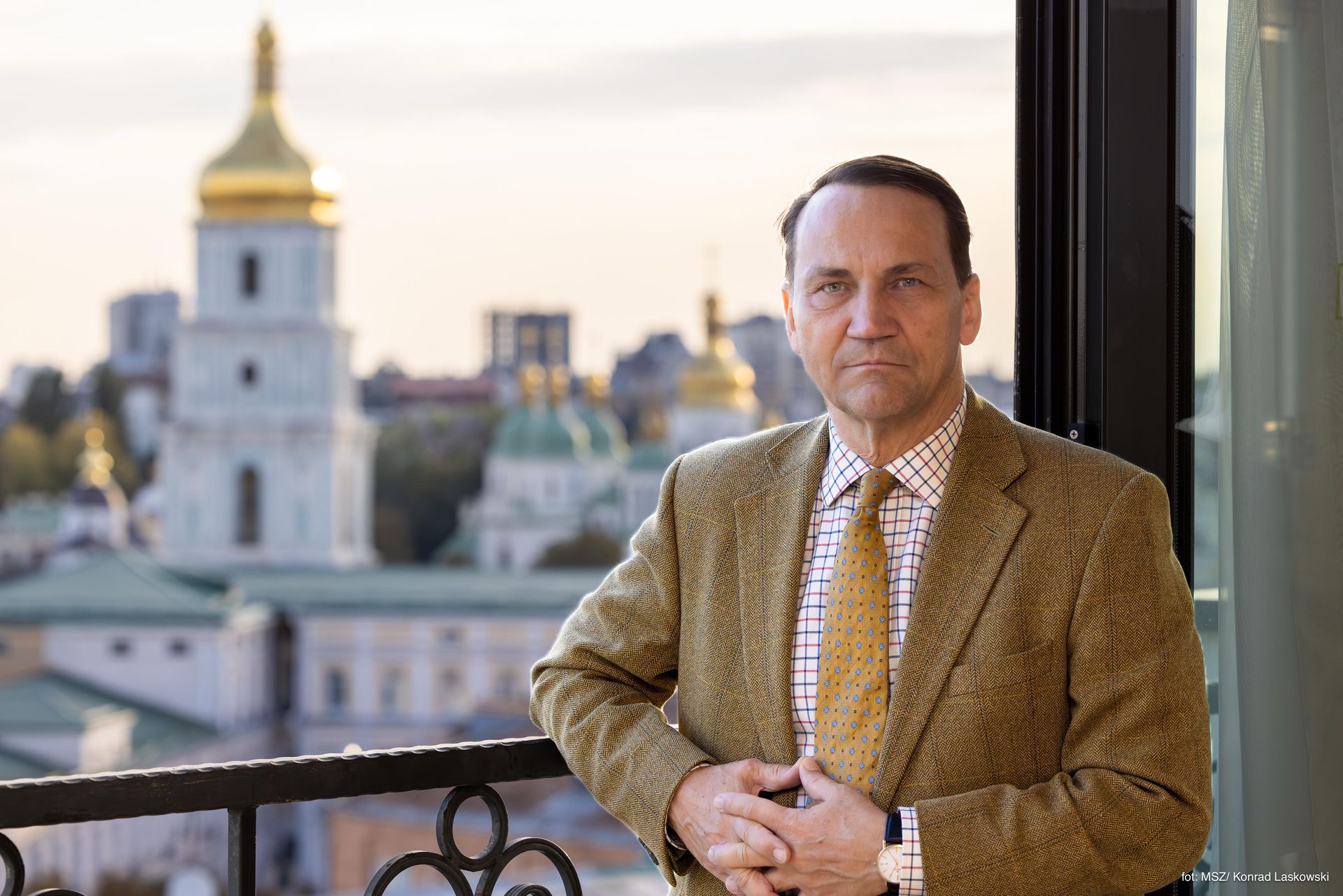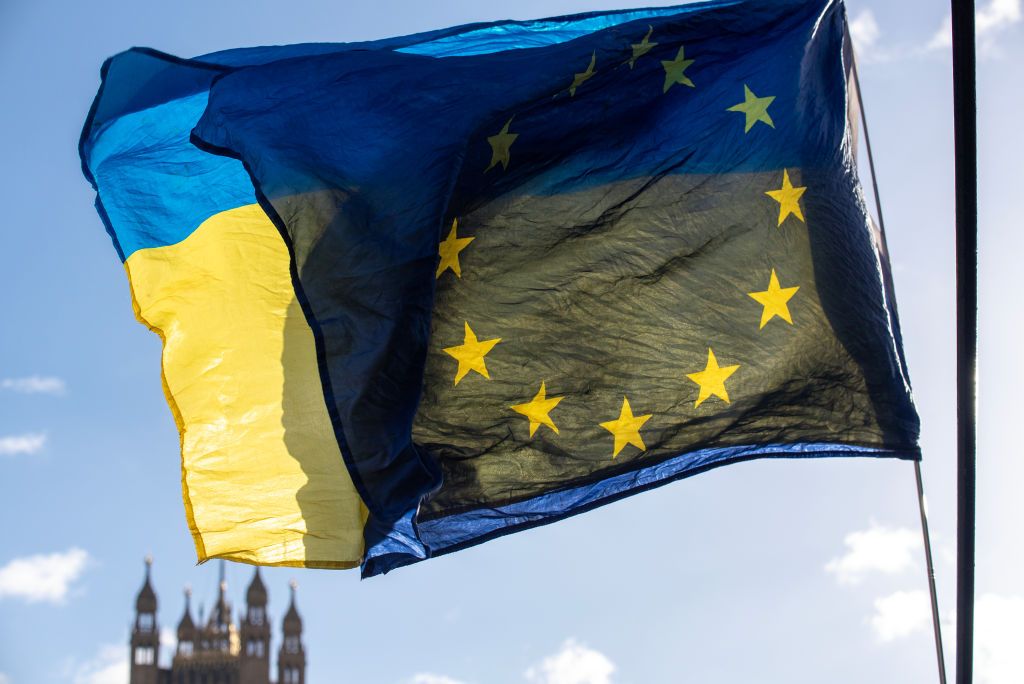Tragedy, unity, and defiance in Kyiv

President Volodymyr Zelensky (L) and Mark Carney, Canada's prime minister, ahead of a joint news conference in Kyiv, Ukraine, on Sunday, Aug. 24, 2025. (Andrew Kravchenko/Bloomberg via Getty Images)

Natalka Cmoc
The past month in Ukraine has been intense, even by the standards of this war.
One of the most outspoken Ukrainian advocates for freedom, democracy, and human rights, former speaker of the Ukrainian Parliament Andriy Parubiy, was assassinated in broad daylight on the street in Lviv.
Parubiy played a pivotal role in the EuroMaidan Revolution of 2014. Ukrainians widely believe that he was shot for his immense influence in setting a firm course for Ukraine to join the European Union. He was shot dead on the same day as European foreign ministers were meeting in Copenhagen on how to pressure Moscow to end its war.
At the same time, Russia has increased the brutality and frequency of its aerial attacks targeting residential areas and demonstrating its contempt for recent peace efforts.
But on a more hopeful note, Prime Minister Mark Carney's first official visit to Ukraine on the besieged country's Independence Day reinforced Canada's unwavering support.
The Canadian prime minister's lead role in the public events marking the most important annual state holiday with President Volodymyr Zelensky reflected the bond of Canada's historic role as the first Western country to recognize Ukraine's post-Soviet independence in December 1991.
On Aug. 24, in Kyiv's historic Sophia Square, Prime Minister Carney reiterated Canada's solidarity and offered his personal reflections. He described his youth growing up in Edmonton, where classmates had Ukrainian last names and Ukrainian language and culture was part and parcel of his Canada. He then evoked William Kurelek's The Ukrainian Pioneer series of paintings, in which the Ukrainian-Canadian artist depicts in six works the journey of Ukrainian migrants to a new life in Canada.
The six paintings tell the story of a family fleeing their home in the darkness as soldiers raze their village, the arrival by sea in Halifax, and life on the Prairies. The final painting shows a Ukrainian farmer in a wheat field with blue sky above him, living peacefully in Canada. Far-off at the vanishing point is a tiny mushroom cloud; a reminder, as the prime minister said in Kyiv, "that peace, when it comes, can never be taken for granted."
There have been multiple generations of migration to Canada from Ukraine, the latest wave starting in 2022 as Ukrainians escaped Russia's illegal invasion. This year's Independence Day audience understood in the most simple and clear terms, that Canada is inherently tied to Ukraine because its people and culture live, thrive and shape the Canada we know and love.
"The Ukrainian people are at the heart of the Canadian story," as the prime minister said.
Prime Minister Carney recommitted Canada's defense and security assistance for Ukraine. He said clearly that we must deter and fortify by helping rebuild cities, expand industries, develop resources and create the foundations for true prosperity.
Ukraine is building a country that values human dignity at a time when global assaults on democracy have become assaults on humanity. Canadians want to see Ukraine succeed and thrive because, as the prime minister said in Sophia Square, Ukraine's independence "will be our victory."
Prime Minister Carney wanted Ukrainians to know that Canada hears them and sees them. They know Russia's war against Ukraine is an existential one — an attack on Ukraine's values, history, and identity.
Russia has destroyed culturally and historically significant UNESCO sites and detained or imprisoned activists, politicians, and journalists who speak out for Ukraine and resist Russian occupation. More than 16,000 civilians have been unlawfully detained, arbitrarily arrested, gone missing, and disappeared by Russia in the occupied territories; most are still missing today.
Most reprehensibly, thousands of children have been taken and kept in Russia, undergone indoctrination, illegal adoptions, and, on turning 18, have been mobilized to fight against their own homeland.

While in Kyiv, the prime minister also committed Canada to intensifying its work as co-chair of the International Coalition for the Return of Ukrainian Children, working with Ukraine, the United States and other international partners to secure the immediate and unconditional return of Ukrainian children abducted by Russian forces.
President Zelensky, Prime Minister Svyrydenko, and Ukraine's Cabinet of Ministers outlined what they ask of Canada: help Ukraine transform its social policies and services for returned children and civilians to support with their reintegration and rehabilitation.
Meanwhile, cultural and social revival is strong in wartime Ukraine as an act of resistance against Russian efforts at erasure. Ukrainians are proudly, defiantly celebrating their own cultural diversity and history, including their own path of truth and reconciliation on the more challenging episodes of their national story.
As Canada's ambassador to Ukraine, I am often asked to speak to our values and policies, and I am happy to represent all Canadians, stressing our own multicultural and multi-denominational population. In Ukraine, I'm invited to speak at events organized by Ukrainian Muslim, Jewish, and Indigenous communities. I also speak at events centered on women's rights, LGBTQ+ and barrier-free policies, and veterans' needs. Ukrainians are keenly interested in keeping these issues at the forefront in wartime because they refuse to compromise their humanity. Ukraine and Canada are kindred countries in this respect.
As it has throughout history and will continue to do, including in the face of tragedy, Ukraine will keep demonstrating its persistence, ingenuity and innovation. Canadians continue to support Ukraine in advancing its aspirations while fighting this unjust war.
Just a few days before Prime Minister Carney's visit, Canadian philanthropist Jim Temerty was awarded the presidential National Legend of Ukraine. Touchingly, and with humor, Mr. Temerty shared in his remarks how his parents fled their home and community in the Donbas during World War II, leaving everything behind to start over in Montreal. He described how important it was to his parents that Ukrainian was preserved in his family home with his mother's songs, her teaching at Saturday Ukrainian school, and at the dinner table, where he and his sister understood the strong moral sense of respecting their heritage.
The Temerty Foundation has made significant contributions to Ukraine — from humanitarian, education, reconstruction, and defense intelligence. He was also instrumental in Canada being among the first countries to recognize the Holodomor as a genocidal act.
Donor and philanthropic assistance helps, but the most significant next steps to support Ukraine must come from private business investment and partnerships.
Canadian businesses have indicated that they need more security support, such as additional war-risk insurance tools, and a more flexible travel advisory to the western parts of Ukraine. We need to examine what other countries are doing and see what would make sense for Canadian firms and technical experts.
Some countries have assigned a special envoy to help businesses with contacts and delegations. Most pitches are being negotiated on the ground in Ukraine, and we need to think of the services we can provide to help partners learn about the opportunities, understand the projects other countries are pursuing, and help Canadian companies become connected in preparation for reconstruction initiatives.
Canada has expertise in energy, critical minerals, infrastructure, timber, steel and defense. Canadian organizations, civil society and health and social services providers have amalgamated experiences across the spectrum that may serve to inspire Ukraine's post-war recovery be it in the healthcare domain, rehabilitation services and supports for veterans and their families, child wellness and wellbeing, to name but a few.
Now is the time to start thinking about how to capitalize on the strong ties that have been built between Canada and Ukraine — to be there when Ukraine needs Canada most.
Ukraine is fighting not only for its own survival but for the stability and security of Europe: Russia's recent incursion into Poland's airspace shows that Russia will not stop until it is stopped.











